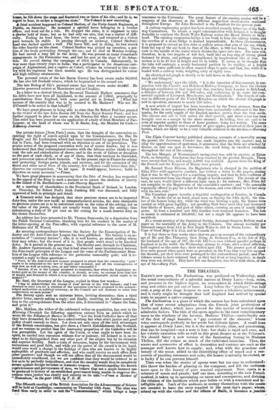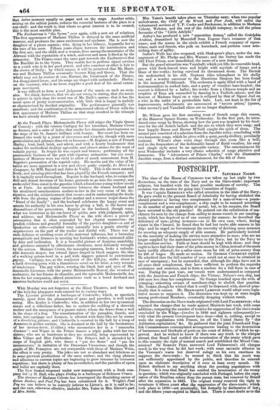THE THEATRES.
BALFE'S new opera, The Enchantress, was produced on Wednesday, amid . the usual concomitants of a splendid success at Drury Lane,—heat,
and pressure in the highest degree, an atmosphere in which fiddle-strings.. snap and critics are put out of tune. Long before the " prologue" was half over, a peep at the stage became to new corners a laborious achievement; and it really might be thought that half England had arrived by special train to support a native composer.
Tke Enchantress is a piece of which the success has been calculated upon that of some recent adaptations from the French, joint productions of Scribe and Auber; which have proved for this species of musical drama admirable feelers. The title of the opera applies in the most complimentary sense to the witchery of the heroine, Madame Thillon—undoubtedly one of the first of stage beauties; a "gay creature of the element," whose voice corresponds perfectly to her petite but delicate figure. A small tone it appears at Drury Lane; but it is the most silvery, clear, and penetrating, that can be imagined—not a note is lost: her shake is rapid and even, and her voluble execution tells as well in this great theatre as at the Princess's We should fancy a new version of the fascinating Sontag-in Madame Thillon, did she evince as much of the cultivated musician. Then, the scenes and accessories of effect in decoration and costume are such as the manager well knows how to supply; and, what with the grandeur and beauty of the scene, added to the electrifying effect of sound and a suc- cession of puzzling entrances and exits, the hearer is actually bewitched, or is lucky if he can prevent himself. Time was when the stories of operas were but too easy to understand: this threw the harden of pleasing on the composer, and left the audience more open to the luxury of pure musical enjoyment. Now, opera is a mixture of music and puzzle: half our time, according to the new French method, is taken up in speculating on cause and consequence, and divining the relation of the incidents which pass before us with a consistent and in- telligible plot. Such of the audience as occupy themselves with the murder. are content to have the story supplied in the next day's paper; where, mixed up with the violins and the effects of Balfe, it becomes a jumble •
that defies memory equally on paper and on the stage. Another critic, seizing on the salient points, reduces the essential business of the piece to a nut-shell: and the troth is, that where no great interest is to be created, this is the most sensible plan.
The Enchantress is "the Syren " over again, with a new set of relations. The first appearance of Madame Thillon is delayed in the same artificial manner, and produces the same excitement and applause. She is now the daughter of a pirate captain; who, dying in her infancy, bequeaths her to the care of his crew. Fifteen years elapse between the introduction and the first act; and the child, now a woman, lives among the mountains of the Abruzzi with the reputation of a witch, and ever and anon is fired at by the peasantry. The Pirates enact the same part towards the Enchantress that the Banditti do to the Syren. They enable her to perform signal services to a youth who is in her good graces, and who somehow or other is heir to the crown of Sicily: by which means, it will be perceived that Mr. Harri- son and Madame Thillon eventually become King and Queen. That the whole may not be conker de rose, Borrani, the Lieutenant of the Pirates, isa disappointed lover; and his songs are tinged with melancholy. Harley, on the contrary, who is no lover, supplies a good deal of his usual extem- pore merriment.
It was difficult to form a cool judgment of the music on such an occa- sion. We think, however, that we are not wrong in stating, that the music is quieter in style than the usual run of Mr. Balfe's operas; that it has the usual spots of pretty instrumentation, with little that is happy in melody or characterized by decided originality. The performance generally was excellent; and the combination of the accustomed effects of Drury with the first appearance of Madame Thillon on that stage resulted in the triumph we have already described.



























 Previous page
Previous page